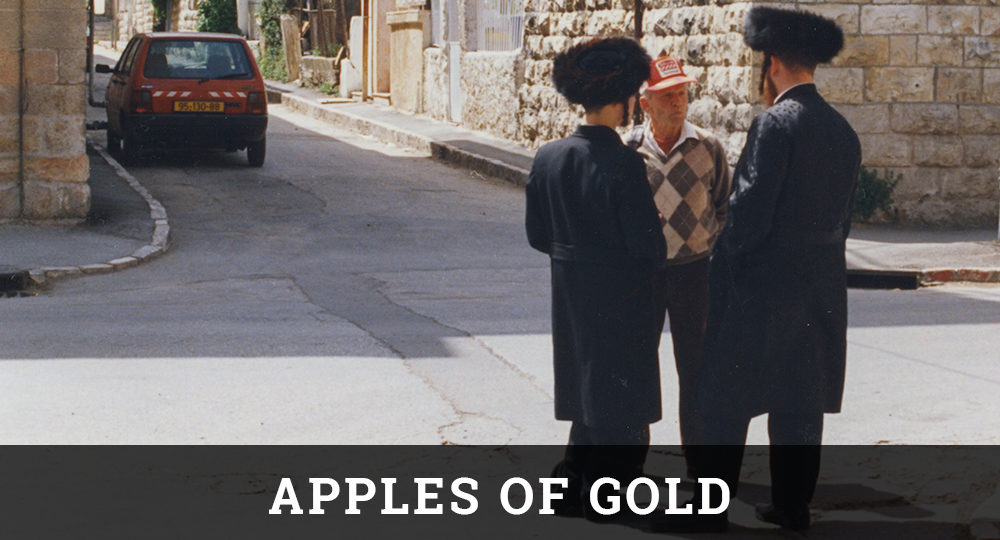Zvi Dec/Jan 1992
The Lord has taught us in His Holy Word how to pray, but sometimes we repeat those words without paying attention to them. If we consider the words carefully, we can see the great meaning and value of the Lord’s Prayer for our daily lives. For example, He taught us to pray, “And lead us not into temptation, but deliver us from evil” (Mt. 6:13; Lk. 11:4).
The importance of that phrase was brought home to me recently when I went to the Ministry of the Interior to renew my identification card. This is also the office that issues passports, and it is always very busy. If you want to get quick service, you must arrive at about 6 a.m., two hours before it actually opens. On this particular morning I was running late and did not arrive until 9 a.m. Naturally, the office was extremely crowded, and I thought to myself, This is hopeless! But I decided that since I was there, I would just be patient, no matter how long it took. I found an empty spot on one of the long benches and sat down to wait my turn. I immediately realized that there was something on the spot where I was sitting, and when I reached down I found a paper bag. Imagine my surprise when I looked inside and found money—a lot of money—U.S. dollars and Israeli shekels. I thought, If I give this to the security officer, he will say, “Thank you very much” and keep it for himself. After all, things like this probably happen all the time. But then I remembered those words: “And lead us not into temptation, but deliver us from evil.”
I decided to take the money to the police station, and of course they were happy I had brought it to them and gave me a receipt. Then one of the officers remarked, “I can see by your clothes that you are not a religious person, so why did you turn in this bag of money? It is a sizeable amount; surely you could have put it to good use.” I replied, “All that glitters is not gold. And why do you judge people by the clothes they wear? As a police officer, you must have had many experiences with people who were well dressed but who are now sitting behind bars. I read in the newspaper a few weeks ago that you put one of the well-known rabbis in prison, and surely he was dressed as one who is, as you say, ‘religious.’”
The officer then said, “It is not often that we see a non-religious person like you who is so honest. I still don’t understand why you brought this money to us.” I responded, “I suppose it will come as a shock to you, but I do believe in the Lord, and it is because I believe in Him and not in mammon that I am here today. You see, if a person believes in the Lord with all his heart, money has no power over his life.” I then remembered the hymn that says, “Nor silver nor gold hath obtained my redemption,” and I recited the words to the officer in Hebrew. I then asked him, “If I, as one who believes in God and is faithful to Him and His Word, were to keep this money, where is my faith? And who should I worship, God or mammon?”
By now our conversation had attracted the attention of several other officers who joined the discussion. Of course, they too wanted to know about me because it was hard for them to accept the fact that a man who did not have his head covered would speak about faith; however, this is nothing new in Israel. Anyone who speaks about the Lord but is not dressed like the ultra-Orthodox is suspected of being a missionary, a word that has a bad connotation in this country. But this does not make me afraid, and I asked these of officers if they knew the meaning of the word missionary. One replied, “It is someone who spreads a false faith.” Then I asked, “What about Abraham and Jonah? Did they try to spread a false faith? Or Ezra and Nehemiah? Did they try to deceive people about God? Of course not! And yet they were all missionaries because they spoke to people about faith in the God of Israel. As a matter of fact, Jonah was punished when he disobeyed God’s command to preach to the people of Nineveh.”
In that police station, sitting in the midst of many officers, I was able to show clearly why I had come there with the bag of money. I told them, “I am not like those great ‘faithful’ rabbis who are now sitting in prison because they were faithful to mammon rather than to God. Where is their great faith now? And why, strictly because of the way they dress, do you consider them so holy when, in fact, they have broken the laws of God and man? It is written, ‘The righteous shall flourish like the palm tree; he shall grow like a cedar in Lebanon’ (Ps. 92:12).”
After much further discussion, one of the officers said, “Let’s get to the root of this situation. How did you come to the conclusion that your faith is right?” I told him, “I have not come to any conclusions. Rather, what I have said is from the holy Bible, and I believe everything that is written there—nothing more and nothing less. Because of my faith, I can say that I believe in the living God rather than in mammon and know in my heart that it is right. It is for this reason that we are having this discussion. It is certainly not because of my wonderful personality or anything else about me. I believe in the Lord, who taught us not to be blind and go after bribes or give in to temptation.”
To my surprise, the officers invited me to have a cup of tea with them, and they asked me to start from the beginning and tell them about myself. I related some of my experiences in Europe during the Holocaust and told them of my 45 years here in Israel, including my long military service. And I was pleased to be able to tell them that throughout those 45 years, I have never once had a problem with the police, which made them very happy. I thank the Lord that because of my faith in Him, rather than in mammon, I had the wonderful opportunity to witness in such an unlikely place as a police station. Please pray with me that these officers will consider the things I told them and come to faith in Jesus as their Messiah and Savior.








